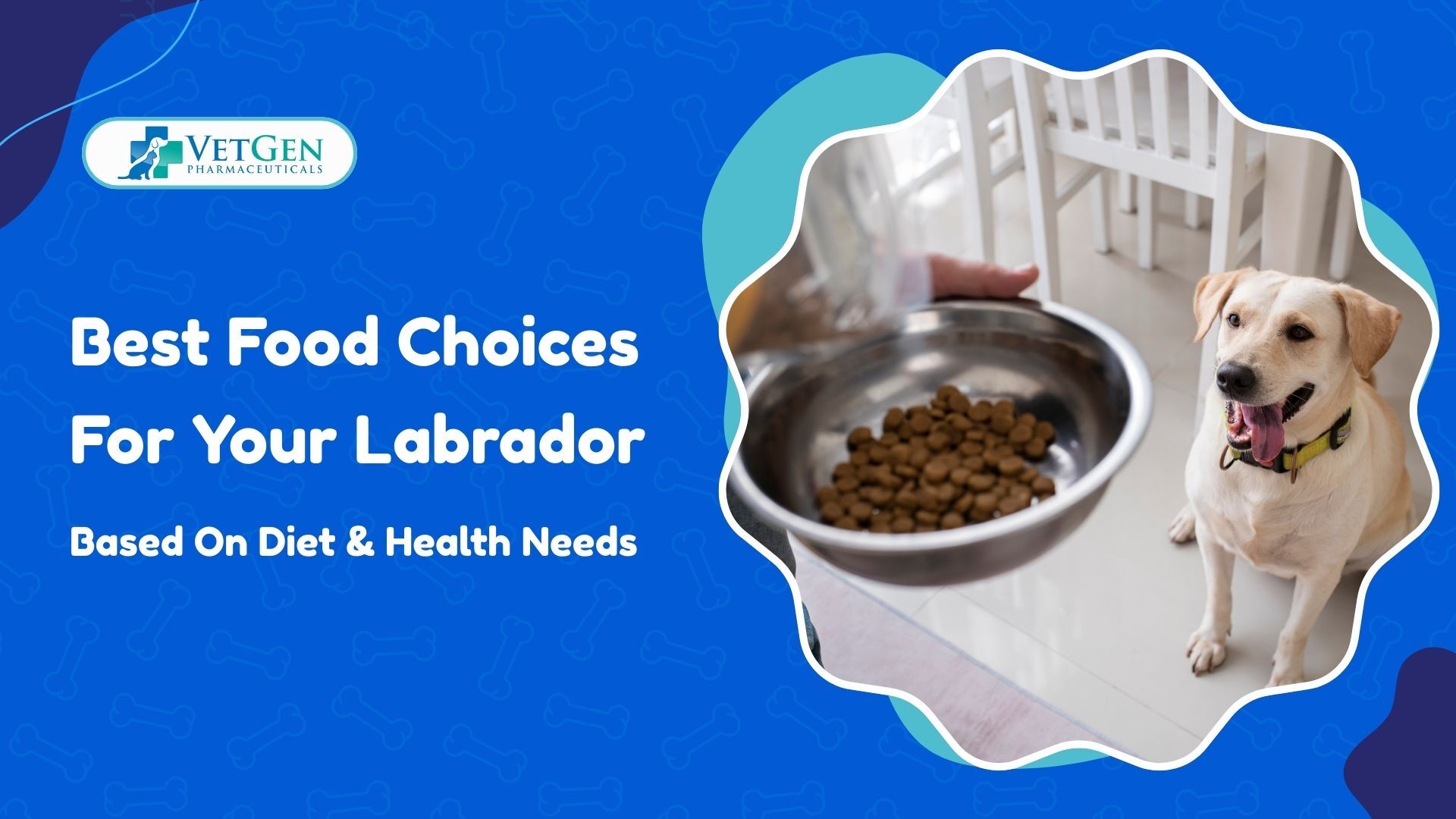Labrador Retrievers are one of the most popular dog breeds worldwide, known for their friendly temperament, intelligence, and high energy levels. Interestingly, studies show that Labradors have a genetic variant (POMC gene mutation) that makes them more prone to obesity due to increased appetite and reduced satiety.
This makes choosing the right food essential for maintaining their health and vitality. A balanced diet tailored to their specific needs such as age, activity level, and medical conditions can help prevent common issues like joint problems, obesity, and allergies.
In this blog, we’ll explore the best food choices for Labradors at various life stages so labrador wonders can make informed decisions regarding their dogs’ food choices.
Understanding the Labrador’s Nutritional Needs
Before we go into the specific food options, it’s essential to understand the core nutritional requirements of Labradors. Like all dogs, Labradors need a balanced diet consisting of:
- Proteins (for muscle maintenance and growth)
- Fats (for energy and skin/coat health)
- Carbohydrates (for additional energy and digestive support)
- Vitamins and minerals (to support immune function and metabolic health)
- Water (crucial for all bodily functions)
However, Labradors have certain breed-specific traits that influence their dietary needs:
1. Prone to Obesity
Labradors have a well-documented genetic predisposition to weight gain. A mutation in the POMC gene, common in the breed, affects appetite control and makes them more food-motivated than other dogs. Overeating and a lack of exercise can quickly lead to obesity, which raises the risk of joint issues, diabetes, and cardiovascular disease.
2. Joint Health Concerns
Labradors are prone to hip and elbow dysplasia, especially as they age or gain excess weight. Their diet should support joint health with ingredients like glucosamine, chondroitin, and omega-3 fatty acids.
3. Active Lifestyle
These dogs are typically very active and require a diet that supports high energy levels, especially during their prime years. Active Labradors benefit from higher protein and fat content in their food.
4. Skin and Coat Health
Labradors often suffer from dry skin or allergies. Essential fatty acids such as omega-3 and omega-6, as well as vitamin E, can help maintain skin health and a glossy coat.
Food Choices for Labrador Puppies (0–12 Months)
Labrador puppies grow quickly and require a nutrient-dense diet to support bone development, muscle growth, and immune system maturity.
What to Look For:
- High-quality animal protein (chicken, lamb, turkey, salmon)
- DHA (Docosahexaenoic Acid) from fish oil to support brain development
- Balanced calcium and phosphorus levels for bone growth
- Probiotics and prebiotics to support digestive health
Recommended Food Types:
- Large-breed puppy formulas: Specifically tailored for breeds like Labradors to prevent overly rapid growth that can stress developing joints.
- Dry kibble with small to medium-sized bites to encourage proper chewing and reduce tartar buildup.
- Wet food can be used in combination for added palatability and hydration.
Feeding Tips:
- Feed 3–4 times per day until 6 months old, then transition to 2 meals a day.
- Monitor weight carefully. Avoid overfeeding even if your puppy seems constantly hungry.
Food Choices for Adult Labradors (1–7 Years)
By the time a Labrador reaches adulthood, the focus shifts to maintaining an ideal weight, supporting an active lifestyle, and preventing chronic health issues.
What to Look For:
- High-quality lean proteins like chicken, turkey, or fish
- Moderate fat levels to prevent weight gain
- Whole grains and fiber (brown rice, barley, oats) for digestive health
- Glucosamine and chondroitin to support joints
- Antioxidants (vitamins C and E, selenium, beta-carotene) to boost immunity
Recommended Food Types:
- Weight-control formulas for less active or neutered Labradors
- High-protein kibbles for working or sporting Labradors
- Grain-inclusive or grain-free diets, depending on sensitivity (always consult your vet)
Feeding Tips:
- Stick to two meals a day.
- Avoid free feeding.
- Use portion control and healthy treats for training and bonding.
Food Choices for Senior Labradors (7+ Years)
Senior Labradors require fewer calories, more joint support, and immune-boosting nutrients to thrive in their golden years.
What to Look For:
- Lower fat and calorie content to prevent obesity
- High-quality protein to maintain muscle mass
- Joint supplements like glucosamine, MSM, and omega-3s
- Added fiber for improved digestion
- L-carnitine to help convert fat into energy
Recommended Food Types:
- Senior dog formulas with a blend of antioxidants, joint support, and easy-to-digest ingredients
- Moist or softened kibble if dental health is declining
Feeding Tips:
- Monitor for weight loss or gain.
- Adjust calorie intake based on activity level.
- Provide fresh water and encourage hydration.
Managing Common Labrador Health Issues with Diet
1. Obesity
Obesity is a major concern for Labradors and contributes to a variety of health issues. If your Labrador is overweight, consider:
- Weight-loss dog food with higher fiber and reduced fat
- Portion-controlled meals
- Healthy treats like baby carrots or apple slices
- Regular exercise (30–60 minutes daily)
2. Hip and Elbow Dysplasia
Nutritional joint support is crucial for Labradors with or at risk for joint disease. Look for:
- Glucosamine and chondroitin in food or as a supplement
- EPA and DHA (from fish oil) to reduce inflammation
- Antioxidants to slow degenerative changes
3. Allergies and Skin Conditions
Some Labradors develop food sensitivities or environmental allergies that manifest as skin irritation, hot spots, or chronic ear infections. Look for:
- Limited ingredient diets (LID) with single protein sources
- Grain-free options, if advised by your vet
- Hydrolyzed protein formulas for confirmed food allergies
- Supplements rich in omega-3s and vitamin E to support skin health
4. Digestive Issues
If your Labrador experiences frequent diarrhea, gas, or vomiting, diet could be a factor. Choose:
- Easily digestible proteins (fish, turkey)
- Probiotics and prebiotics
- High-fiber diets for gut health
Conclusion
Labrador Retrievers are loving, loyal, and active companions who thrive on proper nutrition. Tailoring your Labrador’s diet to their life stage and specific health needs is one of the most powerful ways to ensure a long, vibrant life. Your Labrador deserves the very best, and when in doubt, professional guidance and high-quality products make all the difference.
Visit VetGenPharmaceuticals to learn more advanced information and resources tailored to your Labrador’s health journey.
Frequently Asked Questions
What type of food is best for a Labrador with joint issues?
Labradors are prone to hip and elbow dysplasia. Diet with enough omega-3 fatty acids (like those from fish oil), glucosamine, and chondroitin can help improve joint health and reduce inflammation.
How can I prevent my Labrador from becoming overweight?
Portion control, regular exercise, and feeding high-protein, low-fat food without excess fillers (like corn or soy) are key. Choosing foods formulated for weight management or consulting your vet for a feeding plan also helps.
Are grain-free diets good for Labradors?
Not necessarily. While some Labradors with allergies may benefit from grain-free diets, others do well with whole grains. Always consult your vet, as grain-free diets have been linked to canine heart issues in some studies.





